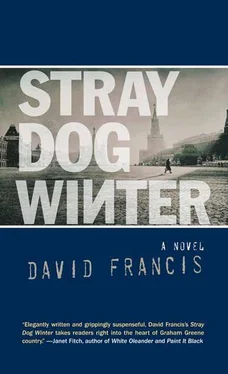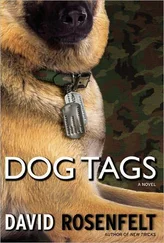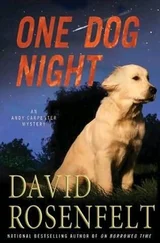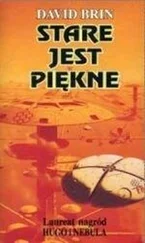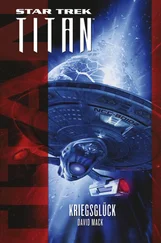Darcy felt the shape of the pistol against his ribs. Can you find out if she’s alive? he asked.
We can try, she said. We know there’s been an incident.
Darcy felt a rush of anger. An incident? He clasped his hands around the tea cup to retain his composure. He needed to be practical. He remembered his map inside his denim jacket, his body layered with damp pockets. He unfolded the map and held it up, pointed to where he’d seen her last, down the river past the Danilov Monastery and the Church of the Ascension, but he suddenly wasn’t sure of directions. He couldn’t find the Southern River Terminal, only the weight of what he’d witnessed, what he’d just done, unravelling within him. You don’t know what I’ve seen, he said, but she told him they were doing what they could, that it was difficult here. Darcy looked up at Ulli de Breffny sensing his bewilderment, and he wasn’t sure if anyone would ever understand.
You know what she was doing here, said Ulli de Breffny, don’t you?
Darcy nodded. I learned, he said, I learned in Lubyanka. He thought it might make an impression but she merely inclined her head.
Essentially, she said, she’s a fugitive. She spoke as if Darcy might need reminding.
She’s my sister, he said, and Ulli de Breffny stared down at the map, at Darcy’s clenched hands. Then she acknowledged a green folder on the desk behind her. A string around it, a row of numbers printed.
We never told them that, she said. We thought it might protect you.
What? he asked. Told them what?
That she’s your sister.
They knew, he said. Again he felt the gun, wished he’d thrown it out into the snow.
I know who you are, she said. I saw a copy of the photo they took of you in Prague. I don’t judge you, she added, touched her fine-edged hair, and as Darcy closed his eyes, he felt it seeding inside him, the fact that one of the hands in his lap had gouged a knife into a Soviet general’s eyes.
Ulli de Breffny placed her tea on the desk. Foreign Affairs got calls from your mother, she said.
The mention of his mother, the thought of her trying, had Darcy battling a new wave of tears.
Apparently, she was very upset, saying how you telephoned and told her you might disappear. She kept saying your name and then the name Sarfin.
Darcy looked up with a kind of glazed wonder. Do you know who Sarfin is? he asked.
An associate of Gorbachev, she said. He works inside the KGB, and outside. She knew all about him. She broke off the corner of a biscuit and held it out in the air.
Darcy closed his eyes tightly. His son, Aurelio, became my friend here, he said. He has disappeared. I think he might be dead. The general cut his face up, he said, as punishment.
Darcy could tell by the way she shifted against the desk that this was a thing she hadn’t known. We’re doing all we can, she said sincerely, but Darcy watched her, trying to gauge the scope of her authority—there was nothing she could do, not about Aurelio, not about Fin, and now the phone beside her was ringing. Ulli de Breffny glanced at her watch before she answered. She listened, not speaking, then she responded in measured Russian. The only word Darcy recognised was Sarfin . She replaced the receiver and went to a small window, looked down at the Lada. A man called Tugrul has been shot, she said. The Turkish Consul-General.
As she turned, Darcy peeled his collar to reveal the blood on his neck. I knew him, he said. I was there. He could feel himself rocking, wanting to confess before others arrived, but Ulli de Breffny didn’t pick up her tea. She was thinking.
Did you really not know you smuggled a stolen document? she asked. You travelled with a time bomb.
Darcy’s breath hung quietly in his lungs. No, he said. I didn’t. Not then.
Do you know where the document might be now?
Darcy was silent and the woman’s face softened. What do you want, Darcy Bright?
I want to go home, he said.
Then you should tell me, she said. And I will see what we can do.
Darcy found himself seeing, in a way he’d forgotten, a chasm of hope placed in the air like a next breath. He removed the damp plastic envelope from his pocket, watched Ulli de Breffny examine the telegram. She allowed an odd pursed smile. One more thing, she said. Why is it you have the car? She waited, almost smiling, as if inviting him.
Darcy stared into his emptied cup. You said you could only help if I got myself here, he said, careful with each of the words. General Sarfin didn’t kill me. He wanted me. He tried in Lubyanka. To rape me. He would have been raping me now.
Ulli de Breffny shifted along the desk, flattening her skirt. But you were in the house of the General Secretary’s daughter.
He wanted me clean, said Darcy. That’s what he said. He told me he’d split me in two. Darcy nodded, afraid he was telling too much. He’s on the floor of Anyetta Chernenko’s bathroom. I put a knife in his eye. Darcy didn’t produce the gun but he pulled the stained knife from the velvety coat and placed it on the low table beside him. It’s his car, he said.
Ulli de Breffny was clearly unsettled. She stood and, taking the folder and the evidence bag, left the room. Darcy could hear her on another phone, but the words were just murmurs and he had a sudden desire to wash himself now, see if he could stop the shivering, the noises in his head. He took off the coat, cautiously, as if the general still lurked in its folds, and removed the gun, the shining silver, unsure who lived or who died. He laid the coat hurriedly over the gun in his hand as Ulli de Breffny returned. We will need to get you out of Moscow, she said.
Darcy looked over at her pale lipstick, the intent in her eyes. She was more official now, laying out a possibility. You will need a passport, she said. And we will need to change your name. But we have to get you out before this becomes a major incident. The Soviets may suppress this but they will want you silenced. She went back to her window, stared down at the general’s car. I don’t understand how you are alive, she said.
Darcy looked down at the coat draped over his arm, covering the gun and the hand that had sliced up the face of Gorbachev’s friend and touched Aurelio’s cheek. He unveiled the pistol and stood, offered it to her, his palm splayed open, trembling.
Whose is it? she asked.
General Sarfin’s, he said. It was used to shoot Consul Tugrul and Nikolai Chuprakov. And maybe Aurelio Sarfin.
And your hands have been all over it, she said. She held out a cloth napkin and Darcy slid the gun onto it as if performing some ritual exchange, the velvet coat still hanging over his forearm. She wrapped it in the napkin and weighed it in her palm. She seemed somehow impressed with him.
I want to ask you a personal question, she said gently. Why did you really come to Moscow?
Darcy thought of the urgent tone in Fin’s voice when she called the first time, when she’d said she needed him here, a chance to be far from home, where he might avoid the new disease. He didn’t know what winter meant then. He raised his eyes to respond, searched the face of this immaculate woman, looked at her as if he really knew. I came to see my sister, he said, and to paint. It had been true back then, mostly. The word paint seemed to resonate.
Ulli de Breffny turned and looked back out her window, the gun in one hand, the telegram in the other. Only in a world without evil are the naïve devoid of guilt, she said.
Sheremetyevo Airport
Monday, 9 am
The Aeroflot 747 taxied. Darcy peered out nervously, past abandoned cranes like rusted mantises, old jets waiting for Lufthansa parts. The control tower thrust up through the earth like an ancient corrugated rocket. Almost as he’d envisioned it, yet not—the hum had fixed itself as a low note in his right ear, his hands were shaking, but he had a dressing on his neck and he’d showered, eaten, he was warm. He clutched his new blue passport and airline ticket, fearing still he’d not be allowed to leave the ground. He examined the passport, the coat of arms and a sober photo, pieces of Fin in his face. His new name was Warwick Rawson, it seemed obvious as a made-up name, a reinvention, but it wasn’t Dobrolyubova. And it struck him now, deep in his core and his psyche, that he was leaving without her. He’d never known her, not really, and he’d never get to know Aurelio; there were only the pangs of longing and mistrust, a love that lay too close to destruction and a small colour photo, wrinkled now, of Aurelio as a boy.
Читать дальше
